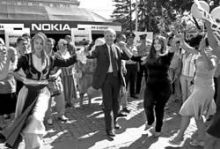“Too large, too poor, too Soviet” is the prevailing European stereotype of Ukraine today, and it is complicating the process of Ukraine’s European integration. So says Hryhoriy Nemyria, foreign policy and European integration advisor to Ukraine’s prime minister. He voiced this opinion during European Meetings 2005, held for the first time in Ukraine as part of the Europe Day festivities in Donetsk. Still, Ukraine is gradually removing obstacles from its path. For starters, it is no longer Soviet in terms of citizens’ worldviews, behaviors, and understanding of their civil rights.
Proof of this was the celebration of Europe Day in Donetsk, which turned out to be a truly European event. According to many opinion pollsters, who converged on Donetsk’s main public square to survey local residents on a variety of issues, this event revealed an absolutely new worldview. According to one poll, this year the public gravitated not so much to the traditional concert by popular singers as to the so-called European town, where embassies of EU member states and Ukrainian civic organizations provided information about the European Union and the latest news from Brussels. Diplomats from EU embassies and the European Commission Office in Ukraine were also available to answer questions from the public.
The guests of honor contributed to the creation of “European corners” across the highly industrialized region of Donbas and planted a European Alley of Friendship. The tree-planting event was attended by all the European guests and representatives of the regional authorities, who planted an alley of 21 trees of rare species and labeled them with the names of each of the honorable guests. The head of the European Commission Office in Ukraine, Ien Boug, said this was primarily a symbolic event: “We have planted this alley, but we will not be around to see these trees grow. Likewise, we will not necessarily see the results of our work for the benefit of society.”
The celebrations in Donetsk did not entirely steer clear of politics. Speaking at a news conference the previous day, Ien Boug ruled out any political confrontations in Donetsk that day. Anatoliy Blyzniuk, deputy chairman of the Donetsk Oblast Council and chairman of the Regions Party’s Donetsk oblast center, was of the same opinion. Their promise proved true: The Regions Party behaved very peacefully and staged a nonviolent rally in support of Borys Kolesnikov, who is being held in custody.
The Day asked some of the guests of honor to share their impressions of the festivities.
Pierre COLOT, Belgian Ambassador to Ukraine:
“I was very impressed with Donetsk, which is a very beautiful and new city. It’s heartening to see that it is so progressive. Here we saw many modern, European-style buildings. Your country will be able to integrate into Europe in the future; it has a European future. Of course, much now depends on Ukraine. I feel that the Ukrainian population of today is completely different from last year’s. Much also depends on the government and whether it will succeed in meeting Ukrainians’ expectations. I believe that the Ukrainian and European mentalities are one and the same thing, because we have common values. Frankly, I don’t feel that I am in a foreign country.”
Ien BOUG, Head of the European Commission Office in Ukraine:
“We were most impressed with the kind-hearted citizens and the warm reception they gave us. The city itself is very beautiful and verdant. The people here are very open to the ideas of European integration, which shows both at the level of the authorities and among the region’s citizens. Moreover, the implementation of the Ukraine-EU Action Plan is playing an important role, because this document envisions specific measures and reforms that can greatly benefit Donetsk, given its geographical location and economic position. The action plan spans three years during which time a whole range of reforms will be implemented. Among the key reforms are administrative and socioeconomic reforms. All of them are aimed at improving the investment and business climate in Ukraine, which will in turn attract direct foreign investment and foreign investors to Ukraine. Ukraine’s accession to the EU means that EU standards and principles will be at work here, especially those relating to issues of democracy, human rights, rule of law, and work in the common European space and market. I understand that people are afraid of the possible consequences of EU membership. This is understandable, but the European Union has also undergone many changes in the process of its development. Since its inception the EU has accumulated considerable knowledge and experience necessary to overcoming the consequences of these changes. I think this is precisely where the EU can help Ukraine.”
Rinat AKHMETOV, president of the Shakhtar soccer club:
“I’m very glad that Europe Day was held in Donetsk. I feel like a European and think that Ukraine is part of Europe. I believe that we must take what’s best in other countries and build it here. I attach great importance to such visits. Perhaps Donetsk hasn’t made a very good impression in the West, but I’m certain that opinions about our land will improve in the nearest future. If we host more visits like this, world opinion about our region will improve. Ukraine has things to show, and it has much to learn from others. We must always learn and adopt the best practices.”







